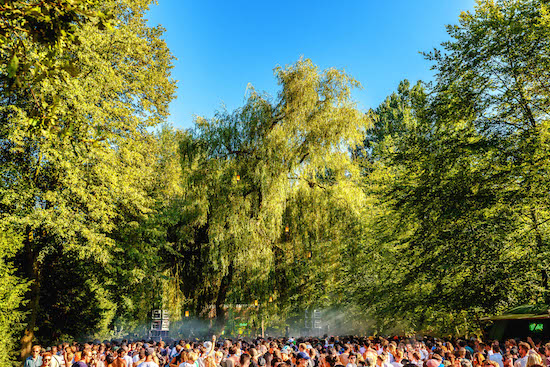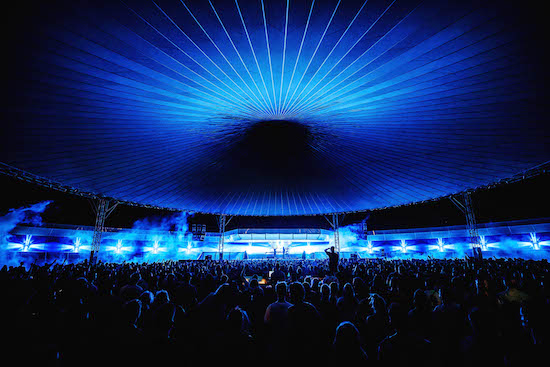All photos courtesy of Bart Heemskerk
A few hours into the second day of this year’s Dekmantel festival, a panel discussion focused on marketing yourself as a musician in the social media era got underway at Amsterdam’s EYE Film Institute, as part of the event’s opening programme within the city. Jamal Moss, AKA Hieroglyphic Being, sitting alongside Varg and Sassy J, broached a recent quarrel he had online regarding the boxing in of genres and artists. Stating that the frequent tendency to label the music that different people make is limiting to their art, and its ability to make some form of difference to society, Moss railed against journalists and music fans alike.
Dekmantel is a festival that has previously perhaps best been known as one associated with a certain corner of electronic music, its early line-ups for the most part, though not exclusively, favouring DJs and performers playing and producing house, techno, disco and electro. Recent years, however, have seen considerable reinvention and an honourable variation in the music represented from the opening concerts at various sites dotted near the centre of the city to the three-day thrill of the main event at the woods in the Amsterdamse Bos found in the outskirts of Amsterdam.
Moss, perhaps best known for his scrappy, machine-led grooves released as Hieroglyphic Being, played live later that evening at Tolhuistuin as part of A.R.E. Project, alongside Shabaka Hutchings and Sarathy Korwar. It was an opening concert programme that boasted the likes of Tangerine Dream, Japanese composer Yasuaki Shimizu, Congolese collective KOKOKO!, James Holden & The Animal Spirits, Laraaji, Aïsha Devi, Pan Daijing and Terry & Gyan Riley, amongst many others.
As the sixth edition of the festival, yet another rapid sell-out, got underway at the Amsterdamse Bos, it was immediately clear, once again, why Dekmantel is regarded as such a tightly-run operation. Last-minute cancellations – Xosar due to lost gear and Donato Dozzy as well as Rødhåd’s second set due to illness – were swiftly dealt with, seeing other DJs stepping up to the mantle and updated set times passed around the site. Excessive queues were non-existent and the site continues to be one of Europe’s best to experience the growing forms of music that Dekmantel’s programme is taking in with each passing year. The weather, though often mercilessly hot, was also on form through the weekend.

Look back to some of Dekmantel festival’s early line-ups and you get a slightly different picture of the event in names such as Dixon, Âme, Tale Of Us cropping up. It’s not that you expect the team behind booking the event think they’re above inviting certain names now but with every passing year there’s been an increasung willingness to take risks – naturally one might consider with the sales that each year now seemingly guarantees. However, in 2018, a number of the scene’s biggest names were notably missing. Some were acts that you can expect to see filling numerous European festival line-ups through each summer: Jeff Mills, Nina Kraviz, Robert Hood, Ben Klock, Marcel Dettmann. Others were DJs that Dekmantel have continually championed and perhaps helped to build up over the years: the likes of Motor City Drum Ensemble, Ben UFO and Hunee & Antal (all of whom have each been afforded the opportunity to close the main stage over the previous two editions).
Perhaps the most obvious candidate to be making that step up at this year’s festival was Helena Hauff who closed the slightly redesigned main stage – still rooted around a large white structure but one that somehow felt a little less monolithic and impersonal than those of previous years – on the final night. Her two hours on stage rolled through a relentless blast of bass-driven electro and speedy techno, taking in recent set favourites such as the rave stabs of Paul Blackford’s ‘1991’ and the apocalyptic acid of The Mover’s ‘Doom Computer’. Combined with an ever-tasteful light show and an unbeatable energy from the masses that gathered at the main stage – a number of crutches could be seen held aloft at various points – Hauff’s appearance was an undoubted weekend highlight that proved she is the most in-form DJ in the world right now. Having continuously built the tempo through the bulk of her set, things came to a head with the downtempo sleaze of a remix of Autechre’s ‘Basscadet’ by Beaumont Hannant, fading out to rapturous applause.

Another programming highlight came in the form of a Dekmantel favourite – Call Super – stepping up for an early evening main stage slot following Ricardo Villalobos. While the latter’s set didn’t quite live up to admittedly high expectations (can we please give Floorplan’s ‘Never Grow Old’ a rest now?), the former delicately balanced the esoteric with the crowd-pleasing over the course of 90 minutes. Cutting and chopping through UK techno (LOFT’s ‘Oh Well, We’re All Fucked Now’), ‘90s tech-house (Bushwacka!’s ‘Chorus’ and ‘Healer’), a smattering of classics (DJ Rolando’s ‘Knights Of The Jaguar’ and Frank De Wulf’s trance-y take on Golden Girls’ ‘Kinetic’) and spacey ambient (in tracks from Barker and Global Communcation), Call Super’s step up to the main stage saw Dekmantel continue its tradition of finding new ways to showcase regulars. This was also on display in extended opening slots for Rødhåd and DJ Nobu in the dark techno cave of the UFO – both of whom are usual headliners of the stage at this point.
The UFO extended a little this year also to take in a smaller adjacent stage, simply dubbed UFO II. Promising more experimentally-edged techno, live sets from Fixmer & McCarthy, Karen Gwyer, Samuel Kerridge, Varg and more threw up a chance for Dekmantel to offer something a little different from the whirring synths and unrelenting kick drums of the main techno-oriented stage. On Saturday afternoon, Errorsmith showcased tracks from his excellent 2017 album Superlative Fatigue in the sweaty indoor area. Working through the riotous, hyper colourful synths of tracks such as ‘I’m Interesting, Cheerful & Sociable’ and ‘Centroid’, his set came to a head in the swampy, halftime sounds of slower tracks from last year’s album such as ‘Retired Low-Level Internal Server’ and ‘Internet Of Screws’. Unfortunate equipment failure 10 minutes before the set’s end did nothing to dampen one of the penultimate day’s standout sets. Later that night, DJ Stingray closed UFO II to a crowd that spilled out of the indoor structure pulsing through his usual rapid-fire brand of electro before bowing out on a volley of dubstep, grime and footwork from Jlin.

Drum & bass and jungle were a significant presence at this year’s festival too, cropping up in Four Tet’s Saturday night main stage set as well as Friday night closing sets from Objekt (in the UFO) and Joy Orbison (at Selectors). The former moved through a selection of recent halftime, juke and techstep-indebted cuts having built in the first hour from electro, techno and a dose of hard drum tracks through to SOPHIE’s brilliant recent album cut ‘Immaterial’ – bafflingly to the chagrin of some online commenters. Sunday night’s action in the Greenhouse was most obviously tipped in the favour of those seeking out something a little faster, as Source Direct played back-to-back with Paul Woolford under his Special Request alias followed by a Metalheadz classics-themed pairing between Goldie and Randall. The former duo favoured austere, heavy-hitting golden era cuts (Nasty Habits’ remix of Doc Scott’s ‘Drumz ’95’, the VIP take on DJ Trace & Nico’s ‘Monkeys’) light on melody but rich in low-end frequencies that proved that Dekmantel’s soundsystems are amongst the best of any festival.
Just before Source Direct and Special Request, The Bug and Miss Red brought a different kind of bass pressure to the Greenhouse in a set underpinned by Kevin Martin’s distinctive, unrivalled production style. Miss Red paced through tracks from her recent debut album K.O., commanding the stage and geeing up the throng ahead of her as Martin busied himself with the equipment set-up behind her, naturally finding time at around the halfway mark for ‘Skeng’. Other final day highlights came from Courtesy and Mama Snake & Solid Blake’s sets at Boiler Room and the UFO respectively, both of which blended mind-bending, pace-y techno (much of which presumably emerging from Copenhagen’s close-knit scene) with breakbeats and a healthy dose of unashamedly euphoric ‘90s trance (Kay Cee’s ‘Love Stimulation’ in the case of Courtesy, DJ Wag & Y.O.M.C.’s 303-laced remix of X-Trance’s ‘Friends’ from Mama Snake & Solid Blake). With more variety on offer than ever before at the festival, Dekmantel’s sixth edition saw the team behind the festival showcase their unrivalled ability to please all kinds of camps.

Below, you can find a YouTube playlist featuring 50 tracks heard around the site at this year’s Dekmantel, in sets from the likes of Helena Hauff, Objekt, Lena Willikens, Errorsmith, DJ Stingray, Daphni, Shanti Celeste and many more.


